On Friday afternoon I was granted some brief beachside time with Moonlight Kingdom director-cowriter Wes Anderson. It turned out pretty well, I think. Apologies for my Canon camera doing an abrupt switch-off at the ten-minute mark.
Day: May 18, 2012
Matter Of Fact
In my book Sean Penn didn’t “explode” or even get angry, not really, when he said that “the whole fucking world has abandoned Haiti.” He was just emphasizing a fact with the use of a normal, no-big-deal f-bomb. The way he’s speaking in this video clip (taken by myself) is more characteristic of the tone of yesterday afternoon’s press conference, held to promote last night’s benefit carnival for Haiti.
“It’s not only celebrities who went for a day,” Penn said in the press conference room inside the Grand Palais . “It’s the whole fucking world. It’s all of you.”
I asked about Haiti fatigue and the general feeling that God has been cruel to Haiti and that nothing ever seem to work there democracy-wise or decency-wise. Everything about Haiti connotes despair and futility. Penn said that “the reason we have Haiti fatigue is because there was never a commitment in the first place.”
“Joker Is Lucky…”
I’ve never felt much rapport with Will Smith (his surface-skimming, auto-pilot sense of humor, conservative movie choices, Scientology) but yesterday’s incident at the Moscow premiere of Men in Black 3 was okay. A Ukranian TV reporter reportedly “notorious for kissing celebrities” tried to punk Smith with a kiss on the mouth, and Smith shut him down and gave him the back of his hand. And I got that.
Girls Together Outrageously
Cristian Mungiu‘s Beyond The Hills screened at the Salle Debussy twice this evening, at 7 and 10 pm. I caught the 7pm with a capacity crowd. It’s an intensely austere, moralistic, monastic and harsh-atmosphere thing with repressed Sapphic undertones and all kinds of authoritarian foulness and constipation. The slowly building film observes the tyranny of religion and considers the inevitable result of trying to keep long-building steam from escaping the pot.
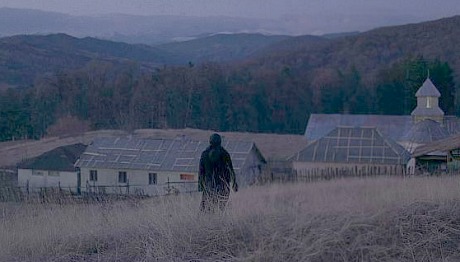
Mungiu’s screenplay is based upon a 2006 book called “Deadly Confession” by Tatiana Niculescu Bran, which is based on true events. Boiled down, it’s about love denied and an improvised exorcism gone wrong. It’s about two female friends, Voiochita and Alina (Cosmina Stratan, Cristina Flutur), who grew up together and became lovers in an abusive state orphanage, and who are reunited when Alina comes to visit Voichita, who has become a nun at a remote and highly primitive convent in rural Romania.
It’s basically about Alina wanting Voichita to be her lover again and perhaps even get her to abandon the convent and leave with her, and when Voichita refuses it’s about Alina deciding she wants also to submit to the discipline and denial of a monastic life but not really — she just wants to cling to Voichita under any circumstance. These currents are soon decipherable, of course, and the priest and the nuns to what they can to head them off at the pass if not squelch them, and eventually things turn manic and loony and then violent. It all turns out very badly.
Tweet summary: “Cristian Mungiu’s Beyond The Hills is a long, somewhat downerish Bresson film about faith, blockage, monastic ritual and denial, love, insanity, eroticsim, exorcism & the evil one. Very austere, muffled and forbidding. Vaguely creepy, chilly, very slow and deliberate. Disturbing but it doesn’t really pay off. And yet it sort of does. Could or would the ascetic Bresson have made Beyond The Hills? And if he had, would his God have been pleased, angry or non-plussed?”
It’s very well acted by everyone, top to bottom. I believed every second of it.
When the 7pm show came to an end two or three people mooed. Not booed but mooed like cows in the field. I’ve heard boos in Cannes before and these were not that.
Leave It Alone
As much as I loathe Mitt Romney, it doesn’t seem fair to try and beat him up for mentioning Adolf Hitler in a strictly anecdotal way during a speech five years ago. He referred to Hitler having turned to liquified coal when his oil reserves were running out in the final stages of World War II. Not that liquified coal is a good idea, but Romney never said “one thing Hitler did right.” This is all about his having said Adolf’s name…that’s all.
Everybody Needs…What?
The Paperboy doesn’t screen here until next Thursday…jeez. Okay, fine. Six days here feels like three in other places. Everything starts to flow and bleed and mix into everything else, like one huge pot of gumbo. Cristian Mungiu‘s Beyond The Hills starts in nine minutes. That’s it…shutdown.
Stiller Tapout
Ben Stiller is here in Cannes to promote Madagascar 3, but I’ve read that he’s also lending his name and presence to tonight’s Haiti Cannes fundraiser. I wrote him a half-hour ago asking what his involvement is, and he responded as follows:
“Sean Penn and Paul Haggis have done extensive work in Haiti over the last two to three years. Both JPHRO and AFH are organizations that take the attiude of their founders, which is ‘just get it done.’ Our art auction ‘Artists For Haiti’ back in September (in collaboration with gallerist David Zwirner and generous donations of art from artists like Marllene Dumas, Chris Offili, Luc Tuymans, Neo Rauch, Jeff Koons and Ed Ruscha), raised about $13.7 million and a lot of it went to fund APJ and JPHRO.
“From school buildings to cholera clinics to rubble removal, these organizations are commited to helping Haitians help themselves to a better future. And one thing that people should know is that Haggis and Penn are not dilletantes. They are there and on the ground in a very real way, doing the work.”
Catch Your Breath

Carlton Beach around 2:10 pm prior to a sitdown with Moonrise Kingdom director-cowriter Wes Anderson. The interview went pretty well but the video has taken months to upload, and it’s still loading.
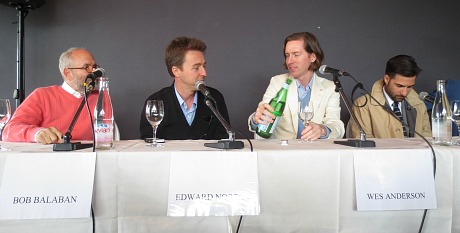
(l. to r.) Moonrise Kingdom costars Bob Balaban, Edward Norton, director Wes Anderson,

It seemed worth noting for posterity that today Anderson and I shared a certain sartorial flourish.
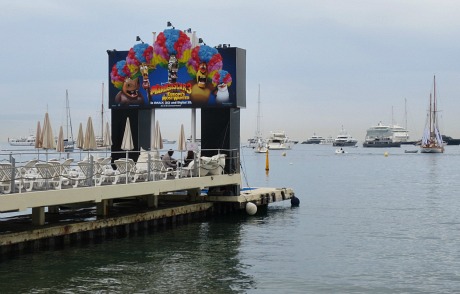
I think I’m going to pass on seeing Madagascar 3…no offense.

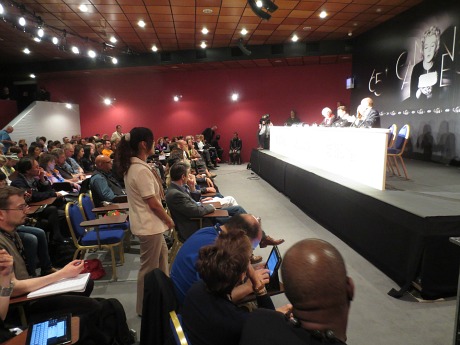
I have fairly good (if shaky) video footage of Sean Penn explaining the basic Haiti Cannes fundraiser situation, but it’s also taking eons to load into YouTube.

What kind of person would want to travel the world on one of these things? I’ll tell you what kind of person would want to travel the world on one of these things. A person who is deathly afraid of experiencing the exotic and the unfamiliar.
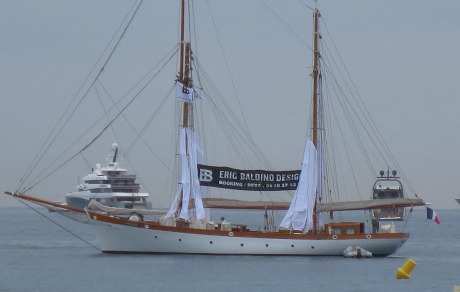
What kind of a person wouldn’t want to get around the Mediterranean on one of these ships? I’ll tell you what kind of a person wouldn’t want to get around the Mediterranean on one of these ships. A person who prefers to travel on one of those super-behemoth cruise ships.
Rocchi and Stone
Excellent pieces about what it’s like to struggle in the Cannes trenches have been written by MSN Hitlist columnist James Rocchi and Awards Daily‘s Sasha Stone. I was going to excerpt Sasha’s Cannes Diary, Day #1 piece yesterday but the moment passed so here’s Cannes Diary, Day #2. (She’s taking excellent photos besides.) And here’s an excerpt from Rocchi’s article, which just went up:
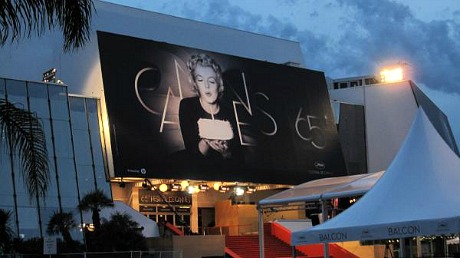
“You could, theoretically, spend hundreds, if not thousands of Euros here daily — a decent upscale meal starts at 18 Euros, and the exchange rate is stiff. But as a member of the press, you try and conserve your cash. Do you go with the only-in-certain-area?s free wi-fi provided by Euro-telecom Orange, or do you shell out the equivalent of $140 for the works-anywhere pay version? [Wells insert: I bought the $140 wifi yesterday and it’s worth its weight in gold.]
“How much free Nespresso can you drink in lieu of paying three times the everyday price for a regular cup of American joe? Just how many people can share a rental flat without going mad like some cruel sociological experiment?
“Worse than the expenses is the cost of time. How early do you have to line up to get into a film you want to (or, if assigned to review, need to) see? Can you put 20 minutes between two films 200 feet apart, or will you be shut out? How can you combine trying to see 3, 4 films a day while not going mad and still having time to write something, anything. The press badges are prioritized by color — Orange, Yellow, Blue, Pink, Pink with a dot (‘Rose et pastill’) and White — and, trust me, this is the time you do want to be Mr. Pink.”
Brolin Scores
I’ve found three positive reviews of Men in Black 3, which I find impossible to accept. (Sorry.) Here’s review #1, review #2 and review #3. I will, however, temporarily accept the following assessment of Josh Brolin‘s performance as the young Tommy Lee Jones, written by Digital Spy‘s Stella Papamichael:
“As Jones’ younger incarnation in a parellel universe (circa 1969), Brolin “somehow manages to do a better Tommy Lee Jones than Tommy Lee Jones,” she writes. “It’s a performance so downright eerie, you could be tempted into thinking that Brolin is, in fact, some kind of alien body-snatcher. What makes it even funnier is the way Smith looks at him, with a sideways grin, as if he can’t quite believe it either. Brolin might simply have delivered an uncanny impression of Jones, but he lets the mask slip at opportune moments, allowing a credible bond [with Will Smith] to develop.”
Let’s stop there until some known-quantity big guns give MIBIII a thumbs-up.
Oldies and Newies
Here are two sets of before-and-after photos of buildings in East Berlin around 1990 vs. today. I’ve always delighted in the obvious age and weathered appearance of European homes and buildings. Seeing at a glance that a structure has been around for several decades or centuries is the charm of it. If you don’t see that and all you want to do when you see an old building is make it look new, then you are a peon. Either you get it or you don’t. (Go to jump for comparisons.)
Reality Candle
The star of Matteo Garrone‘s Reality is a guy named Aniello Arena, who had no acting credits until this came along. The stand-out is that Arena is serving a 20-year jail term for homicide. He was allowed out of the clink to perform in Garrone’s film, but then had to return so he wasn’t at this morning’s press conference. Arena’s sentence began in 1993 so he’s out next year, or so I’ve read.
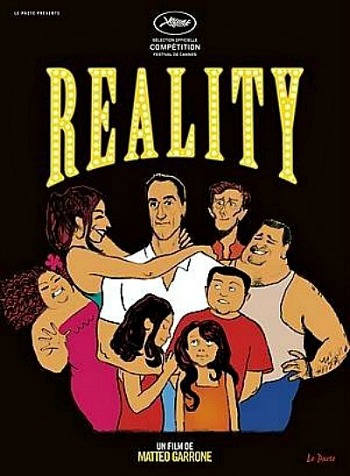
The second I read this I wondered if Arena’s real-life story might make a more interesting film than Reality. Because Reality is a one-idea movie, and one that we’ve all observed and considered and digested for years, which is that “easy fame and instant celebrity through reality TV shows” is the opiate of the 21st Century masses.
Arena plays a relatively happy Napoli fishmonger and animated family man who does a little party-performing on the side. The story is about his taking part in Grande Fratello, the Italian version of Big Brother, and about how he goes nuts when he isn’t chosen but desperately wants to be, blah blah.
My first tweet said that Reality “is about dreams of reality-TV celebrityhood and enslavement that have engulfed the middle classes.” It has a dream-like visual quality, at times almost Fellini-esque, with buckets and buckets of color and pageantry and flamboyance and gabby-gabby-gabby-gabby. And it’s nothing at all like Garrone’s Gomorrah, not even a distant cousin.
Garrone has described Reality as “a simple, working-class tale” and more or less a comedy. Not by my yardstick. It’s an emotionally warm film in many respects but in a sense it’s almost a cousin of George Orwell‘s 1984 as the focus, once Arena’s delusion kicks in, is about a huge malevolent force taking over people’s lives, and a guy losing himself in a putrid dream.
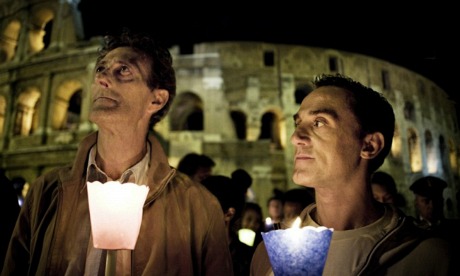
I also tweeted that it reminded me in some ways of Martin Scorsese‘s The King of Comedy as it dips into a similar celebrity-dream lunacy space, a similar form of blindness. But it’s nowhere near as tough or gnarly as the Scorsese.
The bottom line is that the theme of being engulfed by Big Brother fantasies and thereby relinquishing one’s hold on day-to-day reality didn’t feel all that profound. It felt meh. Somewhere around the 75 or 80-minute mark a sinking feeling began to kick in. And up to that point the film revels in itself — light, color, gaiety, production design — but doesn’t really go anywhere either. I was asking myself at the 10, 20, 30, 40 and 50-minute marks, “Okay, but what’s this movie really about?”
Someone tweeted that at least Reality is delivered in bold strokes, and that it “feels like something Buñuel would make if he were alive.” I disagree — Bunuel never went in for the gobs of digression and color-for-color’s-sake that Garrone does here.

